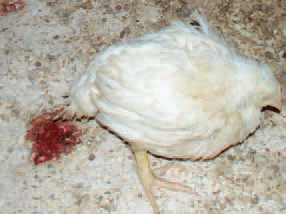Search
Featured post
What does it mean when your Birds start passing Blood in their Feces, and what can you do to prevent it?
What does it mean when your birds start passing blood into their Feces, and what can you do to prevent it?
When housed birds start passing blood in their feces, it calls for concern for both the farmer and the birds. This can lead to panic and severe economic loss on the side of the farmer, and loss of condition and severe discomfort on the side of the birds.
When birds pass blood in their feces, it could mean many things ranging from parasitic infestation to tumor in the intestinal tract of the bird. However, the most common cause of appearance of blood in the stool of housed birds is Coccidiosis.
Coccidiosis is a parasitic disease that mainly affects housed birds that are raised in a deep litter system. It is usually a problem that leads to severe economic losses in startup farms that are in their second or third year of production. It is caused by parasites under the genus Eimeria.
What can you do to prevent it?
Preventing Coccidiosis in poultry can be achieved by maintaining very good hygiene in the farm house. Good hygienic practice can include changing the litter materials as and when due, cleaning and disinfecting the pen/farm house properly before bringing in a new batch of chicks, providing clean water for the birds and changing their drinking water anytime it becomes foul, and observing strict biosecurity measures on the farm (such as using a foot dip before entering the farm house).
It is also a highly recommended practice to employ the expertise of a licensed veterinary doctor to suggest other preventive measures, such as prophylaxis and vaccination. If your birds have already started passing blood into their stool, there is a high possibility that they have already come down with Coccidiosis, so it is best to contact a Veterinarian immediately, to mitigate the loss that is expected.
Calling a Veterinarian for treatment is very important because many drugs exist for Coccidiosis and some are contraindicated for some physiological conditions (For example, Sulphadimidine is contraindicated in laying birds, because it can cause the birds to stop laying eggs). The veterinarian will know the best drug to achieve the best result.
Have you had this kind of challenge on your poultry farm before? What did you do to help the situation? Drop your comments below. Don't forget to share.
Search on Wikipedia
Labels
Most Popular
Tags
- animal health
- antibiotic abuse
- Antimicrobial resistance
- antimicrobial stewardship
- Brooding
- cat
- cat myths
- chicken
- cow
- dairy
- deworming
- dog
- dog care
- dog ethics
- dog grooming
- dog health
- Dog safety
- Dog training
- Dogs
- dress
- exercise
- exertional rhabdomyolysis
- Food safety
- hoof care
- hoof trimming
- Horse
- horse care
- horse disease
- Meat inspection
- Meat safety
- milking
- myths
- parvovirus
- pet
- pet care
- pet care.
- pet health
- Pig farming
- Pigs
- Poultry
- poultry farming
- poultry feed
- tick infestation




0 Comments